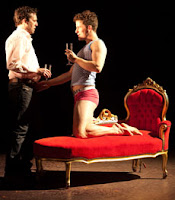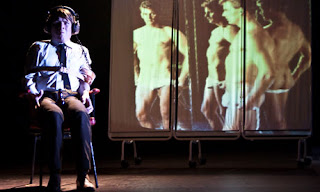(The second play what we saw on our holiday)
 'Women and gay people are the litmus test of whether a society is democratic and respecting human rights. We are the canaries in the mine.'
'Women and gay people are the litmus test of whether a society is democratic and respecting human rights. We are the canaries in the mine.'Peter Tatchell.
This quote, we’re told in the play’s notes, was part of the inspiration behind Jonathan Harvey’s latest play, Canary. The quote might seem a little naive but look closely at it and there’s a lot of true in it, it’s certainly a mark of a society in how it treats its minorities – any society can value the majority – and gay men, lesbians and woman have been politically and economically marginalised in British culture for centuries.
Previously, Jonathan Harvey’s plays have been very personal and domestic dramas, which focus on the lives of a small group of people over a certain period of time (His break through play Beautiful Things is a very good example of this). With Canary, Jonathan Harvey has moved onto much bigger subject matter, and he certainly rises to the occasion.
This is an epic play, its story spans from the police witch hunts of gay men in the early sixties, through aversion therapy of the mid-sixties, to the Gay Liberation front of the nineteen-seventies, through the AIDS crisis of the nineteen-eighties, and the moral backlash that went with it, right up to the present day, with an openly gay man presenting a primetime television program. The play, though, isn’t as neatly laid out as this description. The play jumps from different stories and different time periods, stories running at the same time, but it does all come together.
The play follows Tom, a policeman in the early sixties and a Chief Constable in the present day, and the relationships in his life. In present day Tom, his wife and daughter are besieged in their home by the press because someone has leaked a secret about him. In the nineteen-sixties young Tom and his lover Billy are caught by the police. Billy is sent to a mental hospital for aversion therapy to “cure” him. In the nineteen-seventies Mary Whitehouse plans her Festival of Light to reclaim the country from promiscuity. In the nineteen-eighties teenagers and best friends Russell and Mickey move to London but they get swept in the emerging AIDS crisis.
This isn’t an easy story to follow (As I saw after the performance by other people in the audience who obviously hadn’t followed the plot and were left confused), this isn’t a play just to sit back in and let it flow over yourself, you have to pay attention to the plot. The play goes from high comedy (the scene were the Gay Liberation Front disrupt the Festival of Light had me crying with laughter), to painful drama, through horror (the nightmare of aversion therapy) and tragedy (AIDS in the 1980’s), to magic realism (were Tom’s wife Ellie goes through her own journey into her past to make sense of her life). But ultimately this is a deeply rewarding play because here Jonathan Harvey explores the human stories and emotional cost of the events of our recent gay history. Unfortunately this history is being forgotten, our British society seems uninterested the experiences of lesbians and gay men, we may have acceptance but who’s interested in our journey here?
The acting here was universally good, the actors investing so much into their characters to make them come alive, even when the character was not likeable or only in one scene. Paula Wilcox and Sean Gallagher turn in their usual fine performances (I often wonder why these are two aren’t much bigger stars, they give such good performances) but the acting awards here must go to Philip Voss. His performance as older Tom was both cold and reserved but also warmly touching, his reconciliation with his former lover Billy after nearly forty years was almost heart breaking; but his impersonation of Mary Whitehouse made me week with laughter. He played her as a monster in a nylon dress with no understanding of how ridiculous she sounded.
This isn’t an easy, little drama but a bold and broad one, but it is well worth the effort of following its story. Jonathan Harvey here puts on stage stories that are rapidly being forgotten about in our society, stories that have shaped so much of what it means to be a gay man in 2010, stories we need to talk about. This play has been compared to Tony Kushner’s Angels in America, it is certainly in the same epic and political vein, and that’s no bad thing.
Please Jonathan Harvey, more plays like Canary.
Drew.



No comments:
Post a Comment